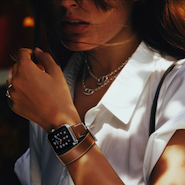- About
- Subscribe Now
- New York,
April 7, 2016

 Promotional image for Hermès Apple Watch
Promotional image for Hermès Apple Watch
VERSAILLES, France – Luxury conglomerates are designed to boost their stable of brands by combining their strong points, but this has not played out in the digital space, according to the co-founder of L2 speaking at The New York Times International Luxury Conference on April 6.
According to L2’s rankings, brands that are digital geniuses and those that are struggling with their online presences are housed within the same group, whether Kering, LVMH or Richemont. The luxury fashion industry in general has moved from a lagging category in digital in 2009 to one of the frontrunners today, but it still needs to make strides in omnichannel.
Trending topics
Kering’s online storefronts are all powered by Yoox, whereas LVMH has not created a uniform infrastructure for its ecommerce businesses. Maureen Mullen, co-founder/head of research at L2, explained that this has caused LVMH’s brands to be across the map in ecommerce performance, whereas Kerings achieve more similar scores.
Unlike other aspects of its business, such as real estate or media, in which LVMH has leveraged enterprise scale successfully, its combined resources do not translate in the same way in digital.
L2 is projecting that LVMH is poised for change in the near future, due to its recent hire of Ian Rogers from Beats Music (see story).
LVMH's Fendi launched ecommerce in 2015
Luxury brands should be watching out for Amazon, which is becoming a larger player in the fashion space. It is now the fastest growing ecommerce platform for apparel, and by the end of the year, it will be the largest retailer in the United States.
Amazon’s sheer size has convinced some key players, including Michael Kors, that they should distribute through its online store. While Amazon may not be a huge direct threat to luxury fashion, its impact is large for the entire fashion industry, with its low prices and speedy delivery.
Retailers need to look at free shipping as an investment, weighing the short-term expense against what can be recouped in the long run, according to a recent report by L2.
With players such as Amazon offering expedited, free shipping options, other retailers have been pushed to adopt similar services, but keeping up can be costly, as brands need to absorb the price of delivery. However, compared to a solely ecommerce business such as Amazon, retailers with a bricks-and-mortar presence are at an advantage when it comes to earning back the price of shipping through upselling and in-store conversions at the point of return (see story).
Also outside the traditional luxury space, Apple is posing a threat to the luxury industry and beyond. The company’s Apple Watch is largely being reported in the media as a failure, but it the smartwatch made $5 billion in the first nine months after its launch.
Apple is also entering the luxury space through partnerships, such as the Hermès strap for the Apple Watch.
Last year the company grew $51 billion. Due to Apple’s supplier negotiations and materials, Ms. Mullen explained it has a volume similar to Ford, but margins that rival Ferrari.
“When one company is taking $51 billion in discretionary purchasing power out of the ecosystem, who does that hurt?” Ms. Mullen said. “It effectively hurts everyone.”
Share your thoughts. Click here